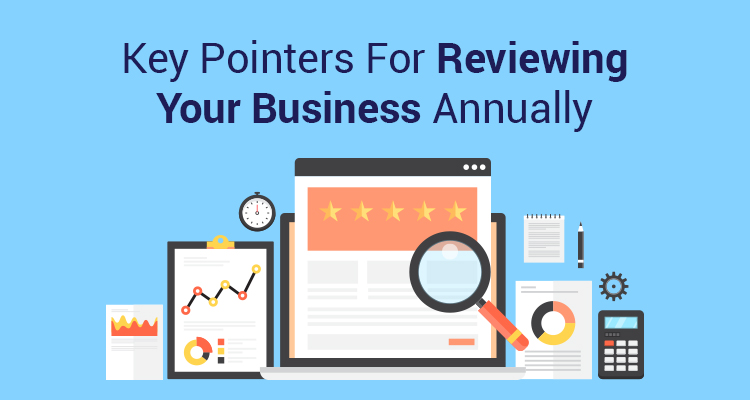Key Pointers For Reviewing Your Business Annually
Table of Contents
To thrive in a competitive landscape, businesses must continuously evolve and meet evolving customer needs. Optimizing expenses, staff, and sales is crucial. A business review evaluates metrics and performance, aligning with overall strategy and objectives. It provides clarity, identifies issues, and fosters shared perspectives for problem-solving and improvement. But what aspects come under the purview of business review? Let's find out.
A] Financial Front:
Evaluating your financial position is a crucial aspect of reviewing your small business's performance at the end of the year. While profitability may take time to achieve, tracking your progress is vital. Key figures to focus on include:Cash Flow:
Understanding the inflow and outflow of money is essential. Analyze your overall cash flow and compare it to previous years to gain insights into your financial outlook for the upcoming year.Cost Base:
Evaluate whether you are obtaining the best prices for your business materials. Compare your cost base with your pricing to determine if adjustments are needed to align with expenses.Financial Growth:
Consider the costs and opportunities associated with business expansion. Factors like hiring more staff, opening additional locations, or adopting new technology can lead to increased income. Assess how these growth initiatives have impacted your business throughout the year.If your business still needs an in-house accountant, consider hiring an external professional to provide financial expertise for your annual review. While you may understand your business's health, a financial expert can offer valuable insights to paint a clearer picture of your year in review.
B] Market Front:
While designing your business plan, you likely conducted a market analysis to gain insights into your target market. However, circumstances sometimes align with our initial expectations. As part of your annual review, it is crucial to identify the factors that have influenced your market since your analysis. This assessment can help you discover opportunities for adapting your business to achieve greater success. Investigate these key aspects of your target market when you review business:Customer Needs:
As business trends evolve, so do the needs of your customers. Take this opportunity to evaluate how your systems can better address their pain points. For instance, real estate coach Matt Vigh focuses on simplifying transactions for buyers and sellers, leveraging technology to enhance the customer experience.Economic Changes:
While national economic shifts have consequences, take notice of the impact of local economic conditions on your business. Changes in local job opportunities or wages can significantly affect your performance.Competitor Status:
Take stock of your competitors and how your business differentiates itself. If there are similar small businesses in your market, emphasize the reasons why customers choose you over them or find a new niche where you can establish a competitive advantage.By continuously assessing these factors, you can adapt your business strategy and stay ahead in a dynamic market. Remember that change presents opportunities for growth and innovation.
Sapna aapka. Business Loan Humara.
Apply NowC] Employee:
When conducting an annual business review, it's crucial to evaluate the performance of your employees, as they are vital to your company's success. Assess factors such as job satisfaction, productivity, and meeting expectations. If improvements are needed, address them when you review business to help employees reach their full potential and contribute to your business's overall success.D] Revisit Your Goals:
Whether you aspire to become the top business in your neighborhood or achieve industry recognition, setting clear short and long-term goals is essential. During your yearly business review, assess your progress towards these goals and seek business tips for the upcoming year. Combine an analysis of your key performance indicators (KPIs) with self-reflective questions like-- What challenges did you face?
- What skills did you acquire?
- How can you avoid past mistakes?
- How can you replicate your successes?
E] Review Your Data Bank:
Looking back at your company's annual data can uncover valuable insights, highlighting areas of concern or hidden successes. In addition to basic accounting and management software, there are various tools available to explore your business analytics. Consider finding a system tailored to your industry or updating your existing one. Here are some key data points to review:Engagement Levels:
Track clicks and sales to identify successful marketing strategies. Use this information to refine your marketing plans for the future.Location Data:
Analyze geolocation data to understand where your sales and leads originate. This helps you identify your target demographics and develop personalized marketing strategies.Feedback:
Encourage audience feedback through online surveys or in-person interactions. Reward customers for product reviews. Use the feedback to improve your services and increase customer satisfaction.Visibility:
Determine how customers find your business, whether through search engines, referrals, or social media platforms. Understanding the most effective marketing channels helps you tailor your efforts to reach your target audience effectively.By leveraging these insights, you can make data-driven decisions that lead to improved marketing, customer engagement, and overall business success.
Conclusion:
Writing an annual business review allows you to reflect on progress, identify areas for improvement, and lay the foundation for future business plans. If your business review reflects chances of expansion and you are considering taking a business loan, connect with a trusted brand like IIFL Finance. Apply for IIFL Finance online business loan today to access capital for your business needs. Benefit from attractive interest rates and watch your business thrive.
Sapna aapka. Business Loan Humara.
Apply NowDisclaimer : The information in this blog is for general purposes only and may change without notice. It does not constitute legal, tax, or financial advice. Readers should seek professional guidance and make decisions at their own discretion. IIFL Finance is not liable for any reliance on this content. Read more




